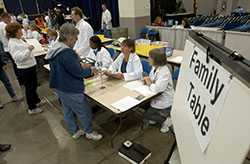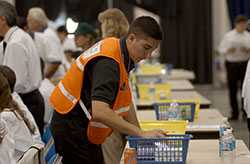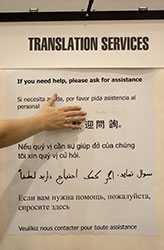Two “Big Box” Retailers Join Local Public Health Departments to Increase Readiness for Public Health Emergencies

Federal Support for Providing Critical Medication During Emergencies. Whether caused by an accident, disease outbreak, or terrorist attack, an emergency could occur requiring the public to receive immediate, life-saving medication. CDC’s Public Health Emergency Preparedness (PHEP) cooperative agreement provides funding to state and local public health departments to support their effective response to a range of public health threats. One of the requirements of the cooperative agreement is for states and localities to develop plans for receiving, distributing, and dispensing medication from the Strategic National Stockpile, a national repository of critical medication and supplies that are available to supplement state and local resources during a public health emergency. The goal in a large-scale emergency is to get medication to the entire population in a short, clinically relevant timeframe (e.g., the release of anthrax into a community would require the public receive medication within 48 hours).

Local Public Health Departments Plan for Significant Challenges. Local public health departments have established plans for dispensing medication at locations within their communities. Typically these locations are in schools, arenas, or other public places and are referred to as open points of dispensing (PODs). However, even with extensive planning by the local health department, it is a challenge to staff enough PODs to provide medication to an entire community in a short timeframe. In addition, a public health emergency can create stress for the public. People could worry about an array of things: the public health emergency itself, traveling to and from the open POD, missing work, calming children during waiting times, and enduring long lines as everyone tries to get their medication. Engaging community partners to expand the dispensing network through partner-staffed PODs can ensure medication is dispensed quickly and strengthen the resilience of the community during an emergency.

Two “Big Box” Retailers and Local Public Health Departments Pilot Program for Dispensing Medication. With the support of CDC, many local public health departments have been engaging with private sector partners to establish alternative PODs in their communities. Recently, two “big box” retailers have begun a pilot with CDC and their respective local public health departments to establish “closed” PODs. Closed PODs are not open to the public; they are company facilities where medication is made available exclusively to a company’s employees and family members. The local health departments are working closely with both companies, ensuring that they have the necessary resources and training to establish closed PODs at their facilities.
The Community, Retailers, Employees, and Families Benefit. The establishment of closed PODs provides substantial advantages for both the retailers and the community. For the retailers, their employees and families can receive medication at company facilities, reducing the likelihood that employees would have to leave work to travel to another POD. This will ultimately help the companies to continue to operate during a difficult time, with employees likely returning to normal duties more quickly. These additional closed PODs also provide great advantages to the entire community. With company employees getting their medication at their workplace, the pressure on existing, open PODs can be reduced, with fewer people in line waiting to get their medication. This innovative type of partnership helps ensure that all members of the community can get their medication within a short timeframe.

These Pilot Programs Are a Significant First Step in Support of Public Health. The pilots are significant for two reasons. First, these two retailers are using the closed POD pilots to test and see how dispensing works with their own employees. If successful, they will help determine if the corporations will allow this type of arrangement with health departments nationally for their stores. Secondly, the pilots are the initial step for moving from closed to open PODs. Local retail stores are attractive alternatives to schools and local civic centers because they have the resources and the capacity to scale up and dispense medication to both their employees and the general public in an open POD. Ultimately, the transition from closed to open PODs will have an even greater impact on public health at a national level, with the public able to get their life-saving medication at their local, neighborhood retailers.
- Page last reviewed: April 10, 2015
- Page last updated: April 10, 2015
- Content source:


 ShareCompartir
ShareCompartir